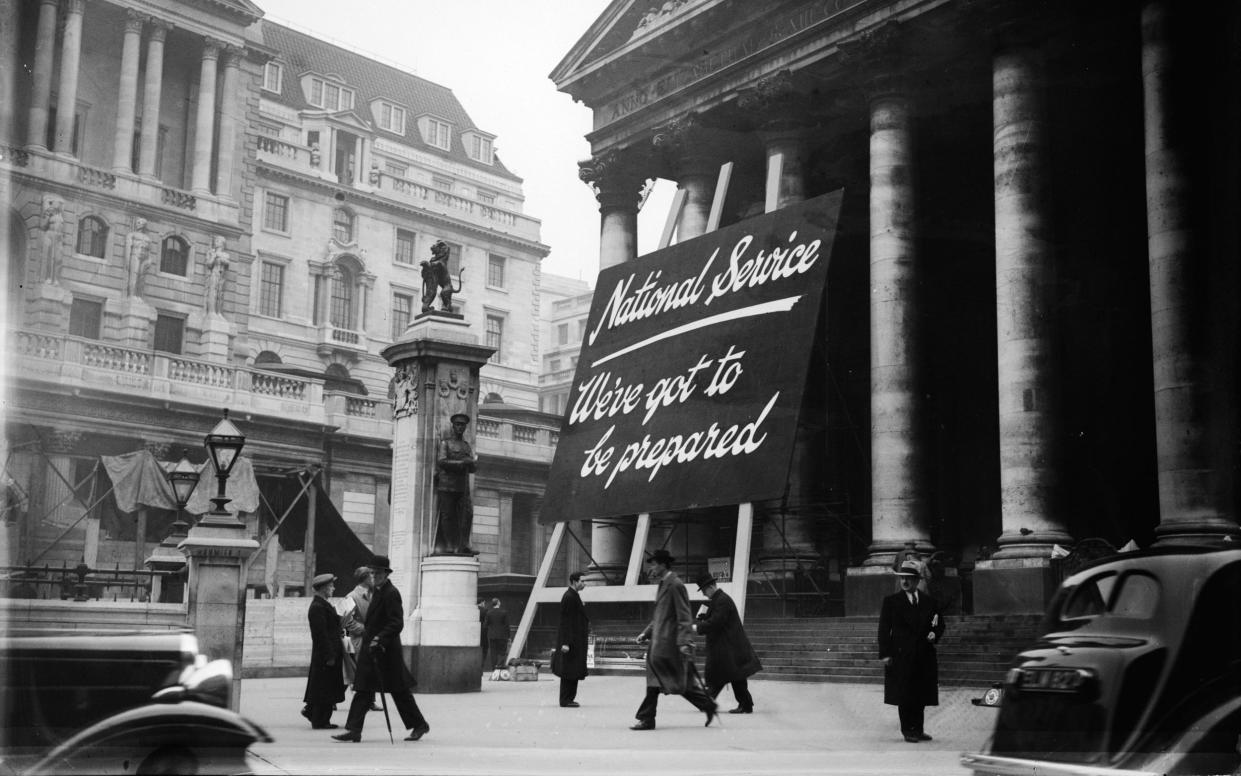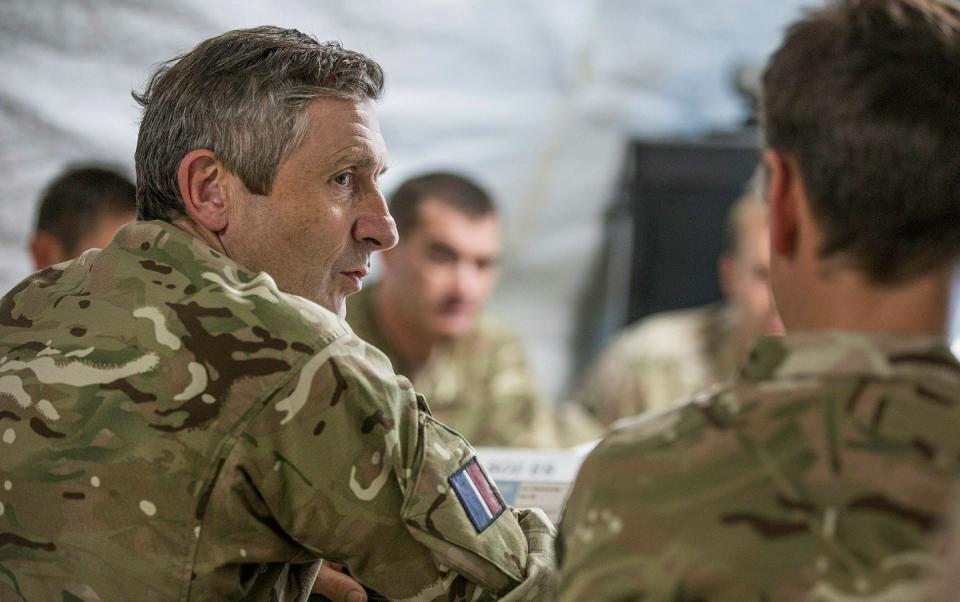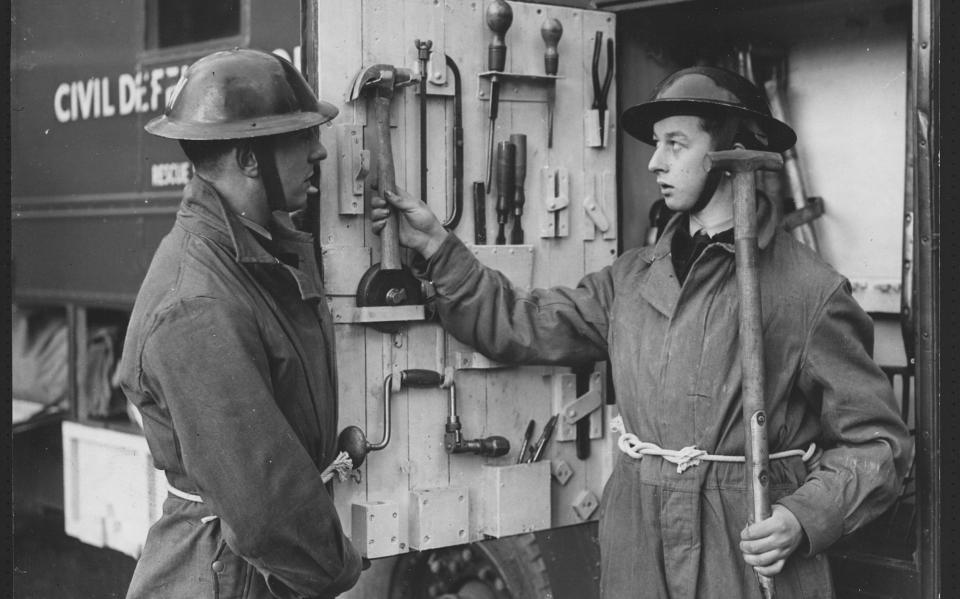National Service return could boost Britain’s resilience, says retired RAF officer

The return of National Service could boost Britain’s resilience, a retired senior RAF officer has said.
Air Marshal Edward Stringer, who served as Director General of Joint Force Development and the Defence Academy, said that other countries have already provided a “model” for how the Government could make a success of the pledge.
The retired officer told the Telegraph that the “devil will be in the detail” but he would “get behind anything that improves national resilience”, adding that it could provide a way for young people to discover new skills and vocations.
In his first major election pledge, Rishi Sunak has vowed to create a mandatory scheme where school leavers will either have to enrol on a 12-month military placement or spend one weekend each month for a year volunteering in their community.

Volunteering could include helping local fire, police and NHS services – as well as charities tackling loneliness and supporting elderly people, it was said.
The Conservatives said they would establish a royal commission bringing in expertise from across the military and civil society to establish the details of what they described as the “bold” programme.
James Cleverly, the Home Secretary, confirmed that there would be no criminal sanctions for young people if they defied the plans.
“There’s going to be no criminal sanction. There’s no one going to jail over this,” he told Sky News’s Sunday Morning With Trevor Phillips programme.
“This is about dealing with what we know to be the case, which is social fragmentation.
“Too many young people live in a bubble within their own communities. They don’t mix with people of different religions, they don’t mix with different viewpoints.”

But concerns over how the scheme would work were also raised by senior military figures, who warned that whilst it was a good idea in theory, it would not work in its current form.
Lord Dannatt, the former head of the Army, said that it could “provide a growing body of people in the country who have some military service and who could be recalled and trained further if the nation was threatened”.
But he said that the announcement had not been “thought through or costed properly” and felt like “electoral opportunism”, which would only work if it were compulsory for all 18-year-olds.
His comments were echoed by Admiral Lord West, a former First Sea Lord and Chief of the Naval Staff, who said that “instinctively” he liked the idea that “rather than identity politics, youngsters would be engaged in the rather grander things like the defence of our nation”.
“But the practicalities are just immense, it is not something that you can do easily, you would need a lot more money. You would need more trainers, more accommodation, more training facilities,” he continued.
“In the short term it is not going to be good for the Armed Forces, which are already hollowed out. This will take eyes off the ball and take capability away from the job of defending the nation. The practicalities mean that it will damage defence.”
Shadow Chancellor Rachel Reeves also attacked the Tories’ plan to bring back National Service for 18-year-olds as an “expensive gimmick”.
Ms Reeves said: “I’m not sure bringing in 18-year-olds for a year will compensate for having a fully professional and trained army.
She added: “This government has failed to meet its army recruitment targets for many years, and we have the smallest army today since the Napoleonic era.
“We need to make sure that we’re running proper recruitment campaigns, that we’re making the army an attractive place to people, including by treating our veterans with respect.”
But Mr Stringer pointed out that National Service is working in countries like Finland, where there is a “very clear national identity” and a sense of responsibility to security, to the military and to society.
He said that the “foundation and bedrock of national resilience” is how much people feel that they are part of a society and suggested National Service could help.
Mr Stringer said that it would take some real “political grit” to get it through but “at the better end of what this could be there is a lot going for it”.

In Norway all 18-year-olds are tested by the armed forces but less than 20 per cent of them are selected to serve, making it a competitive process for a sought-after role.
Princess Ingrid Alexandra, second in line to the throne, is currently serving in an engineering battalion after being tested alongside her peers.
Mr Sunak’s plans would only involve 30,000 “selective, full-time military placements”, suggesting that the Conservatives are planning to adopt a similar model.
If this is the case, it could, in fact, become a desirable role that would be “better than a place at Oxbridge” and set a young person up for life, Mr Stringer said.
“How many young people are going to university and coming out with qualifications that don’t set them up for a meaningful life in graduate jobs?
“Would they be better off doing this for a year, going and finding out that they have an aptitude for coding and software and from that going into more vocational education or straight into the workforce rather than go off to a less demanding course on the periphery of the education sector?
“There are some examples in other countries of how this can work, but everything will be in the implementation.”
The plans were also welcomed by advocates for civil society, including Dame Esther Rantzen, who has been doing voluntary work since she was 12 and said that it can “become addictive so that you do it for the rest of your life”.
“Young people offer a great deal to the charitable sector and other organisations, and this could lure them into the fun of making a difference,” Dame Esther said.
“I would suspect that people who are struggling at school, who are finding academic subjects difficult or who are not very good at sport might actually find that they have much more self-esteem because of the difference that they make volunteering,” she told the Telegraph.
“I certainly think that volunteering has an awful lot to offer young people and young people have an awful lot to offer volunteering. And it is not just young people – how about a bit of compulsory volunteering for the over 65s in return for the triple lock pensions?”
Public backs National Service
The comments came as polling emerged showing that the majority of the public back the idea. Research conducted for Onward, a think tank, last year found that 57 per cent of people supported the Government introducing a “new national service scheme” for young people.
Support stretched across all political affiliations, with voters of all parties backing the idea – but was strongest among Conservatives, with 71 per cent supporting it. The polling also found that nearly three times as many young people supported the scheme than opposed it.
However, opposition critics have dismissed the plans, with Labour saying the pledge would never come to fruition and amounted to “another unfunded commitment”. It is estimated it will cost £2.5 billion a year by the end of the decade but sources reveal that rough calculations show the scheme could be billions off budget.
A Labour spokesperson said: “This is not a plan - it’s a review which could cost billions and is only needed because the Tories hollowed out the armed forces to their smallest size since Napoleon.
“Britain has had enough of the Conservatives, who are bankrupt of ideas, and have no plans to end 14 years of chaos. It’s time to turn the page and rebuild Britain with Labour.”
Nigel Farage claimed the plans were “a good idea but impossible” and would never actually be introduced.
Reform UK’s honorary president told GB News: “National service on any scale is literally impossible unless you build up the size of the Army, and you need another 20,000 people to be trainers if you were doing it seriously.”
Mr Farage also suggested that it was an attempt to woo Reform voters, adding: “Everyone knows he doesn’t mean it, everyone knows he’d never, ever implement it.”

 Yahoo News
Yahoo News 
